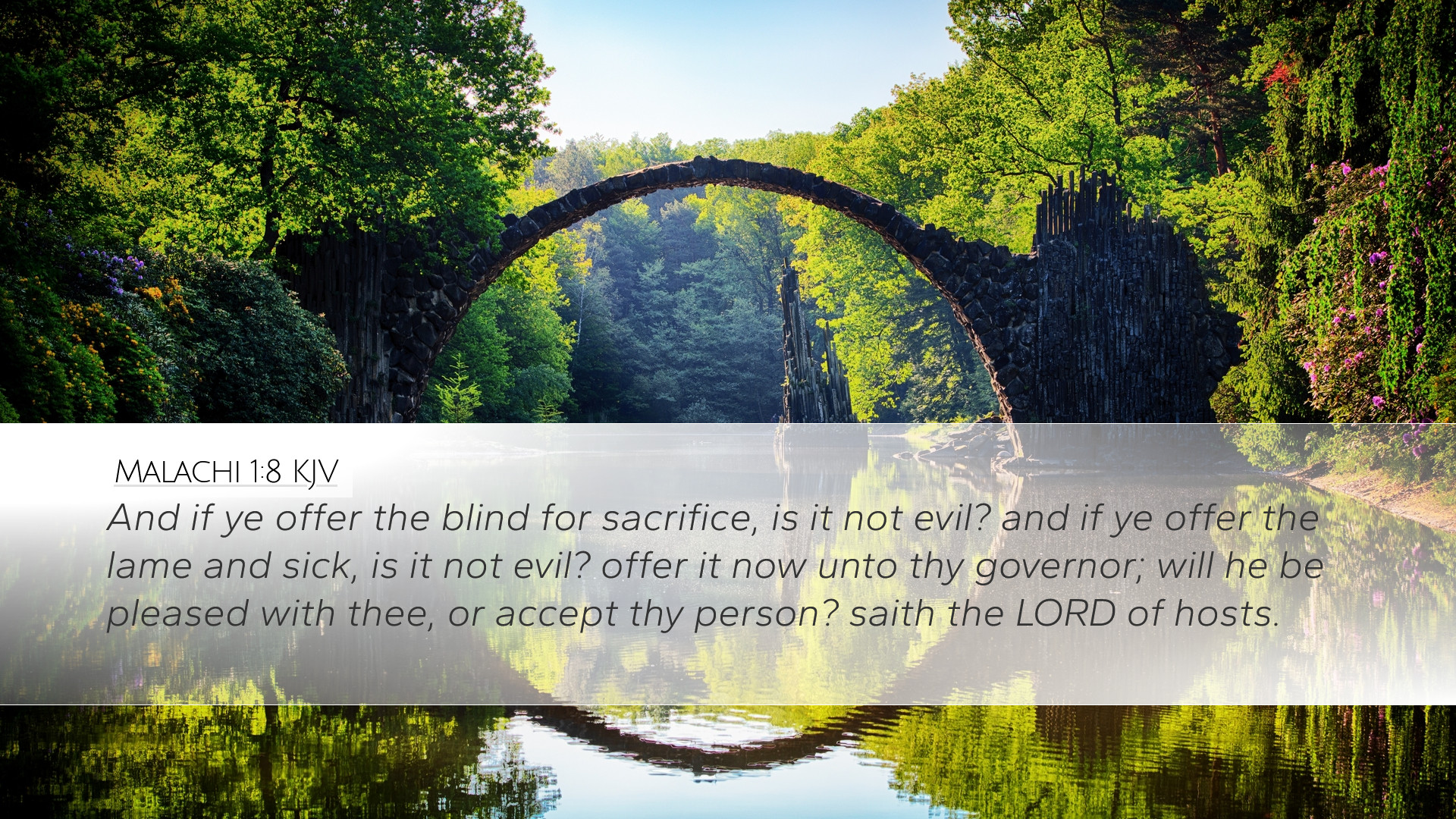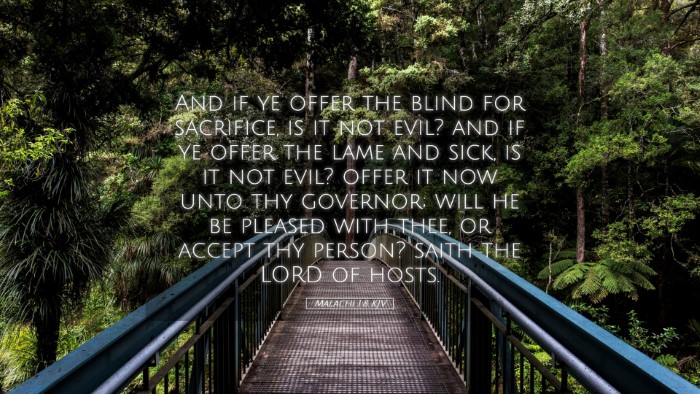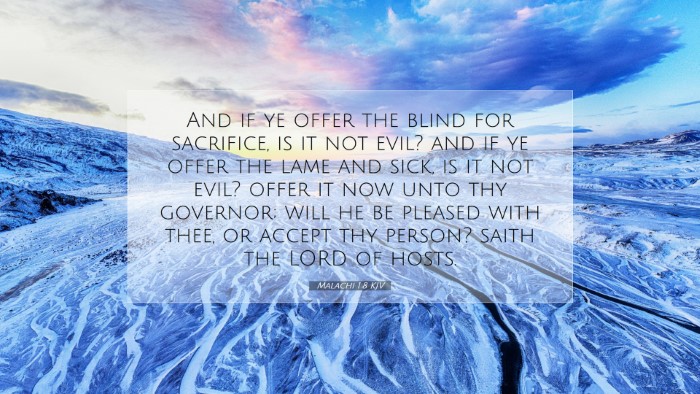Old Testament
Genesis Exodus Leviticus Numbers Deuteronomy Joshua Judges Ruth 1 Samuel 2 Samuel 1 Kings 2 Kings 1 Chronicles 2 Chronicles Ezra Nehemiah Esther Job Psalms Proverbs Ecclesiastes Song of Solomon Isaiah Jeremiah Lamentations Ezekiel Daniel Hosea Joel Amos Obadiah Jonah Micah Nahum Habakkuk Zephaniah Haggai Zechariah MalachiMalachi 1:8
Malachi 1:8 KJV
And if ye offer the blind for sacrifice, is it not evil? and if ye offer the lame and sick, is it not evil? offer it now unto thy governor; will he be pleased with thee, or accept thy person? saith the LORD of hosts.
Malachi 1:8 Bible Commentary
Commentary on Malachi 1:8
The verse Malachi 1:8 states: "And if you offer the blind for sacrifice, is it not evil? And if you offer the lame and sick, is it not evil? Offer it now to your governor; will he be pleased with you or accept you favorably?” says the Lord of hosts.
Introduction
Malachi, the last of the Old Testament prophets, presents a strident call for a return to genuine worship and integrity in offerings. This particular verse critiques the priests and people of Israel for their neglect of God's standards in worship. The implications of their actions resonate deeply within the theological landscape of sacrificial practices, the nature of worship, and the character of God.
Contextual Background
The chapter begins with a declaration of God’s love for Israel, which is juxtaposed against the people's disobedience and apathy. The offerings mentioned here are a reflection of the heart's condition towards God. Malachi's prophetic ministry occurs after the Israelites have returned from Babylonian exile. The temple has been rebuilt, yet the spiritual fervor and faithfulness that should accompany this restoration are waning.
Insights from Matthew Henry
Matthew Henry comments that the blind, lame, and sick offerings signify a gross deficiency in reverence towards God. He emphasizes that these sacrifices indicate a lack of true devotion. Henry states: "The offering of such sacrifices shows a contempt of God and a hasty disregard for things sacred." He draws attention to the absurdity of offering to God what is considered unacceptable by human authorities. By offering defective sacrifices to God, the people display their indifference to His holiness.
Insights from Albert Barnes
Albert Barnes notes the gravity of the implications of Malachi’s taunt. He highlights that such offerings are not merely wrong conduct but are sins against the ordinance of God. Barnes asserts: "The blind and the lame and the sick were expressly forbidden by the Law." According to the Pentateuch, only unblemished animals were to be sacrificed (Leviticus 22:19-21). Barnes connects the act of offering poor sacrifices to a broader attitude of disrespect towards God. The rhetorical questions posed in the verse serve as a compelling argument, challenging the people to reflect on how they value their relationship with God compared to the standards of secular authority.
Insights from Adam Clarke
Adam Clarke provides a nuanced view of the sacrificial system, focusing on its deeper implications. He states that the “blind, lame and sick” offerings symbolize a greater issue—one of spiritual blindness and inability. Clarke analyzes that the people were not merely misinformed but were willfully neglecting the intent and purpose of the sacrificial system, which was to express complete devotion and gratitude to God.
He writes: "Their offerings showed their hearts; they valued what they were giving to God as of little worth." The verse serves as a poignant reminder that what we offer to God should be a reflection of our utmost respect and homage.
Theological Implications
Malachi 1:8 invites pastors and theologians to reflect on the nature of sacrifice and worship in the life of the believer. The true worship demanded by God transcends mere acts; it requires the offering of our best—a theme echoed throughout Scripture.
The phrase "offer it now to your governor" challenges the believer to examine their priorities and the sincerity of their worship. If earthly authorities merit our best, how much more should the King of Kings? It issues a penetrating challenge: Are we offering God our best or merely what is leftover?
Practical Applications
- Integrity in Worship: Believers are called to ensure that their acts of worship reflect a genuine heart and commitment to their faith.
- Reflection on Sacrifice: The study of personal sacrifices—be they time, talents, or resources—should evoke introspection on how they mirror the holiness of God's commands.
- Valuing God's Presence: Recognize God's presence and holiness in worship settings, honoring Him appropriately as we come together as a body of believers.
Conclusion
Malachi 1:8 serves as a divine challenge against spiritual complacency and a call to authentic worship that reflects our devotion to God. By synthesizing contributions from notable commentators, we see that this verse speaks powerfully to contemporary believers, urging them to examine the quality and intent behind their offerings. In the ongoing dialogue about what it means to worship correctly, this passage encapsulates the heart of the matter: offering to God must be done with the sincerity and respect that He alone deserves as our Creator and Savior.


